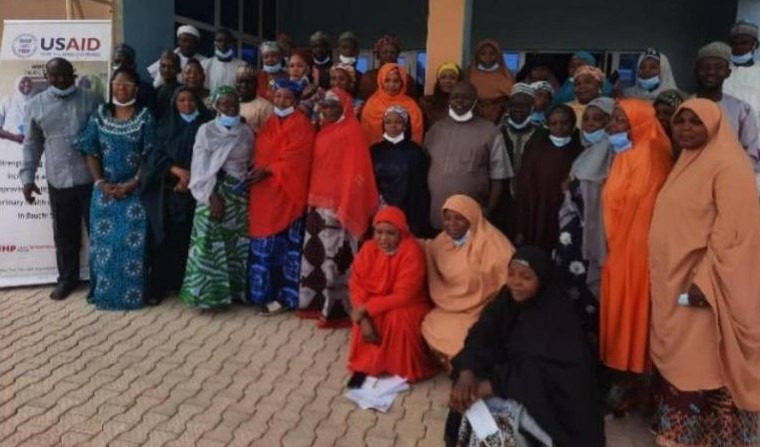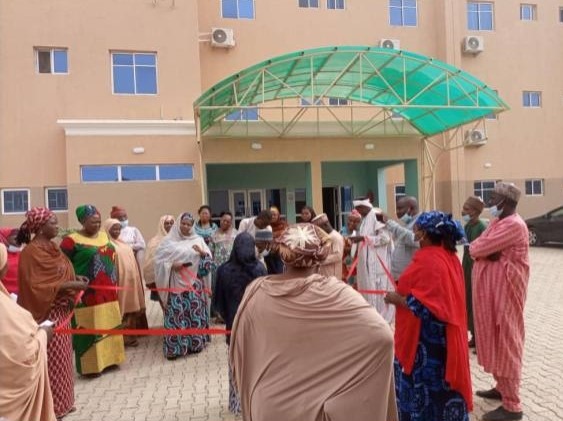IHP Supports State and non-State stakeholders in Strengthening their Commitment and Coordination to Address and Reduce Gender-Based Violence within Bauchi State
Strengthening stakeholder coordination to reduce gender-based violence in Bauchi State, Nigeria
By: Helen John, Gender, Social Inclusion, and Community Engagement (GSI&CE) Advisor; Dr Siaka Alhassan, IHP Bauchi Director
Negative social norms that condone or support violence against women and girls, as well as harmful practices, remain pervasive in Nigeria, where three in ten Nigerian women aged 15 to 49 years have experienced either physical or sexual violence since the age of 15, according to a GBV Helpline Management: Rapid Assessment Report. Without sustained and effective interventions, this reality is likely to increase. In Nigeria’s Bauchi State, it is estimated that 21.7% of women experience physical abuse, 22.7% experience sexual abuse, and 57.3% experience emotional abuse from their partner or spouse.
The USAID Integrated Health Program (IHP) recognizes violence in all of its forms as a human rights violation and a serious impediment to health that must be combated with high-level Bauchi State buy-in and engagement. To combat gender-based violence (GBV), IHP is focused on enhancing prioritization and awareness of GBV, including its root causes and its outcomes; policies, such as the domestication of the Violence Against Persons Prohibition (VAPP) Act and institutionalized protections; and strengthening system capacity at the state and primary healthcare (PHC) level for prevention, response, and referral through evidence-based multi-sectoral strategies and policies.

Coordinating robust, multisectoral GBV prevention and response efforts in Bauchi requires recognizing all key stakeholders. In so doing, survivors are provided with quality care throughout service delivery and referrals. Ensuring quality GBV care, treatment, management, and referral is a complex process due to the number of vital players. To achieve a survivor-centered system, it is critical to secure buy-in from State-level stakeholders to ensure a mutually agreed-upon understanding of quality and institutionalization within State-level Ministries, Departments, and Agencies (MDAs). The first step to securing buy-in is to map out stakeholders. Key State MDAs who need to be involved in establishing and maintaining coordinated GBV prevention and response efforts include:
- State Ministry of Women Affairs and Social Development (MOWASD): Leads and coordinates all State efforts in GBV response and prevention;
- State Ministry of Health (SMOH): Provides skilled personnel and resources for health services across health facilities;
- State Ministry of Justice (SMOJ): Provides access to the legal system services for survivors, enforces locally available laws, and facilitates access to speedy and appropriate justice for survivors;
- Police Forces: Provides protection services, enforces locally available laws, and facilitates the arrest of potential perpetrators; and,
- Non-governmental organizations (NGOs) and civil society organizations (CSOs) also have a key role to play in developing the capacity of local actors and service providers, raising awareness about GBV in communities, and offering financial and human resources to sustain GBV prevention and response.
IHP brought together these key stakeholders through an interactive workshop to develop a GBV referral system. The goal was to review what already existed and design a GBV referral system, which leverages resources within and across sectors, to close the gaps. As a result of this workshop, IHP supported the development of a State GBV referral service directory in collaboration with the State MOWASD and the State GBV Technical Working Group (TWG). The participants developed a multisectoral GBV referral directory that includes health facilities and multisector services, including legal, psychosocial, shelter, and law enforcement.
One of the nurses who attended the workshop, Ms. Khadija Mohammed, noted in a follow-up call, “We have referred two cases. One was an intimate partner violence survivor who was brought here with bleeding. After treating her, we referred the case to the police, which we ordinarily would not have done if it weren’t for the directory.”

Building on these efforts, IHP supported the State to operationalize the GBV referral service directory through a follow-up two-day multi-sectoral workshop in early March 2022. Participants developed GBV action plans and committed to follow up during their specific implementation of the referral system.
Operationalization in practice
The Sexual Assault and Referral Center (SARC), located at the State specialist hospital officially opened through a collaboration between IHP and the State GBV Action Committee. The SARC serves as a key referral center along the newly developed GBV referral directory. IHP provides coaching support to service providers on the provision and improvement of survivor-centered GBV care, and they provide coaching on the accurate and timely documentation of GBV cases using the NHMIS v2019 Out-Patient Department Register. These efforts can be traced back to an IHP-led three-day learning exchange visit in December 2020 at the Nana Khadija GBV Center in Sokoto, a model GBV center, where evidence on best practices for GBV response, referral, and policies was gathered. IHP supported the GBV Action Committee to develop and implement their action plan, which included equipping service providers with knowledge, skills, and processes to provide timely, quality care and referral for GBV survivors. To date, the SARC has responded to 45 (44F, 1M) incidences of GBV.
IHP Bauchi will continue to guide the State to operationalize its GBV action plans, institutionalize its service directory, and expand the reach of the SARC. The next steps include harmonizing the GBV referral forms across different sectors and addressing the need for judiciary representatives to participate in meetings and conversations. In Quarter three, the MOWASD and the State GBV Action Committee, with support from IHP, will deliver training across these same sectors to promote the operationalization of the referral pathway and quality, survivor-centered, respectful, and confidential care across the continuum of GBV services.